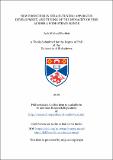New frontiers in strain-tuning : apparatus development, and tuning of the nemacity of FeSe across a wide strain range
Abstract
Over the last decade, an ‘iron age’ of superconductivity has challenged the paradigm of
unconventional pairing established by copper-oxide-based materials. Fascinatingly, in
these iron-based compounds superconductivity emerges from a state in which electrons
choose to distinguish between two equivalent directions of the underlying crystalline
axes. The origin of this ‘nematic’ state is highly debated.
This thesis concentrates on FeSe, a material appealing because its nematicity
does not occur in proximity to long-range magnetic order. Although uniaxial strain
couples to nematic order, experiments to date have focused on applying only a small
symmetry-breaking strain. The mechanical properties of FeSe make utilising established
piezoelectric-based apparatus, designed for continuous tuning of large uniaxial strains,
challenging. In this thesis we develop a platform to which samples can be adhered, and
apply large anisotropic strain to FeSe. When of the same symmetry as the nematicity,
and larger than the structural distortion, this applied strain fully constrains the lattice.
We provide a precise set of resistivity measurements across a wide temperature and
strain range, revealing vital new phenomenologies.
We establish the relationship between electrical transport and nematicity across
a large strain range at the structural transition and, by isolating the influence of domain walls, characterise the elastoresistivity for temperatures below this transition.
By tracking the onset of domain formation, we determine the temperature dependence
of the spontaneous structural distortion, and use this to extract the intrinsic resistivity
anisotropy within a single nematic domain. Interestingly, we discover a crossover at ~ 50 K between distinct high- and low-temperature behaviours.
This thesis is also concerned with the development of apparatus for tuning strain.
We conceptualise a new type of stress-controlled cell, which can apply large (up to
8 GPa in compression) uniaxial stresses to microstructured samples – pushing them to
their ultimate mechanical limit.
Type
Thesis, PhD Doctor of Philosophy
Collections
Description of related resources
New frontiers in strain-tuning : apparatus development, and tuning of the nematicity of FeSe across a wide strain range (Thesis data) Bartlett, J.M., University of St Andrews. DOI: https://doi.org/10.17630/2c041fd5-37cb-4225-bb4e-0b75d4231d21Related resources
https://doi.org/10.17630/2c041fd5-37cb-4225-bb4e-0b75d4231d21Items in the St Andrews Research Repository are protected by copyright, with all rights reserved, unless otherwise indicated.

